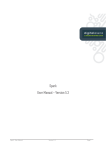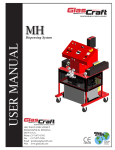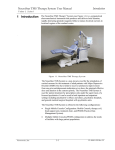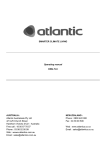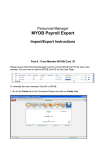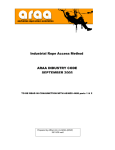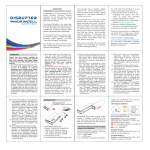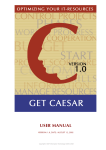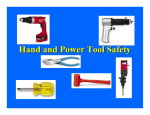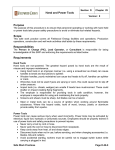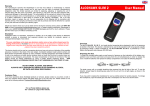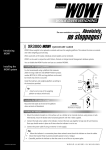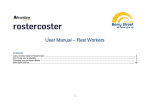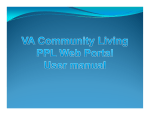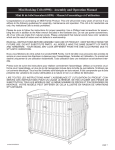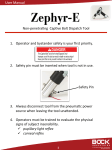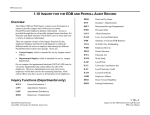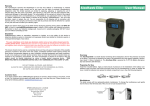Download cmr newsletter jul:aug
Transcript
Issue 18, Jul/ Aug 2015 CMR BI-MONTHLY - Health, Safety & Training Newsletter HAND AND POWER TOOLS TOOLS ARE SUCH A COMMON PART OF OUR LIVES THAT IT IS DIFFICULT TO REMEMBER THAT THEY CAN POSE A THREAT. A SERIOUS INCIDENT CAN OCCUR BEFORE STEPS ARE TAKEN TO IDENTIFY, AVOID OR ELIMINATE TOOL-RELATED HAZARDS. In this issue of CMR Bi-Monthly Newsletter we provide you with essential information to help ensure the safety of yourself and others when working with or around hand and power tools. Employees should be trained in the proper use of all tools. Workers should be able to recognise the hazards associated with the different types of tools and the safety precautions necessary. HAND TOOLS Employees who use hand and power tools and are exposed to the hazards of falling, flying, abrasive, and splashing objects, or to harmful dusts, fumes, mists, vapours, or gases, also should use the appropriate personal protective equipment. FIVE BASIC SAFETY RULES CAN HELP PREVENT HAZARDS ASSOCIATED WITH THE USE OF HAND AND POWER TOOLS • Keep all tools in good condition with regular maintenance • Use the right tool for the job • Examine each tool for damage before use and do not use damaged tools • Operate tools according to the manufacturers’ instructions • Provide and use properly the right personal protective equipment There are many dangers associated with the use of power tools so workplace floors should be kept as clean and dry as possible to prevent accidental slips with or around dangerous power tools. POWER TOOLS NOTE: Power tools must be fitted with guards and safety switches; they are extremely hazardous when used improperly. Safety guards must never be removed when a tool is being used. SOME PRECAUTIONS TO OBSERVE ARE: • Never carry a tool by the cord or hose. • Keep cords and hoses away from heat, oil, and sharp edges. • Disconnect tools when not in use, before servicing, cleaning and when changing accessories (blades, bits, cutters etc.) • Keep all people not involved with the work at a safe distance from the work area. • Secure work with clamps or a vice, freeing both hands to operate the tool. • Avoid accidental starting. Do not hold fingers on the switch button while carrying a plugged-in tool. • Maintain tools with care; keep them sharp and clean for best performance. • Follow instructions in the user's manual for lubricating and changing accessories. • Be sure to keep good footing and maintain good balance when operating power tools. • Wear proper apparel for the task. Loose clothing, ties, or jewellery can become caught in moving parts. • Remove all damaged portable electric tools from use and tag them: "Do Not Use." T: 03 9804 4000 F: 03 9824 6671 E: [email protected] W: www.cmrpersonnel.com.au A: Suite G07, 12 Cato St Hawthorn East VIC 3123 PNEUMATIC TOOLS Pneumatic Tools are powered by compressed air and include chippers, drills, hammers, and sanders. They shoot nails, rivets, staples, or similar fasteners and operate at pressures more than 100 pounds per square inch and must be equipped with a special device to keep fasteners from being ejected, unless the muzzle is pressed against the work surface. There is danger of getting hit by one of the tool's attachments or by some kind of fastener the worker is using with the tool. Check to see that the tools are fastened securely to the air hose to prevent them from becoming disconnected. A short wire or positive locking device attaching the air hose to the tool must also be used and will serve as an added safeguard. PORTABLE ABRASIVE WHEEL TOOLS Portable Abrasive Wheel Tools such as grinding, cutting, polishing, and wire buffing wheels create special safety problems because they may throw off flying fragments. Abrasive wheel tools must be equipped with guards that cover the spindle end, nut, and flange projections, maintain proper alignment with the wheel and do not exceed the strength of the fastenings. Ensure abrasive wheel is inspected closely for damage and sound- or ring-tested to ensure that it is free from cracks or defects. POWDER-ACTUATED TOOLS Powder-Actuated Tools operate like a loaded gun and must be treated with extreme caution. They are so dangerous that they must be operated only by specially trained employees. The muzzle end of the tool must have a protective shield or guard centred perpendicular to and concentric with the barrel to confine any fragments or particles that are projected when the tool is fired. To prevent the tool from firing accidentally, two separate motions are required for firing. The first motion is to bring the tool into the firing position, and the second motion is to pull the trigger. The tool must not be able to operate until it is pressed against the work surface greater than the total weight of the tool. Appropriate personal protective equipment such as safety goggles, appropriate hearing protection and gloves must be worn to protect against hazards that may be encountered while using hand tools. In some cases, depending on the type of tools used, head and face protection is also recommended….but remember, always keep guards on your power tools AND always use the right tool for the job! ALERTS! MANUAL HANDLING – A recent number of injuries relating to poor manual handling has highlighted the need to remain aware of potential risks involved. Before attempting to push, pull or lift a heavy load take a minute to assess the task. Even by visually assessing the materials you can determine whether it will require the help of another person and/or a lifting aid or machinery. In most cases, attempting to rush a task for the sake of finishing will lead to unfortunate circumstances. OTHER NEWS FORUM FIVES EMPLOYERS USEFUL MENTAL HEALTH TOOLS Mining and construction employers benefited from access to a range of tools, resources and experience at WorkCover Queensland’s mental health forum held in Brisbane on 3 June. The forum gave attendees an opportunity to learn from charities Mates in Construction and Beyond Blue, understand legal implications, how treating sleep disorders can help mental health, and a psychiatrist’s view of mental health in the mining industry. They also learnt how technology is used to check the mental wellbeing of a fly in fly out (FIFO) workforce with a real example showcased by Murphy Pipe and Civil which utilised an app by solutions firm MateCheck. COMPANY FINED $250,000 OVER LIVESTOCK DRIVER’S DEATH A company was convicted and fined $250,000 in the Victorian County Court this week over the death of a driver who died when a loading ramp he was standing on collapsed at an abattoir in Stawell.The driver was on the loading ramp when the hoist he was using to move the ramp broke apart above him and the ramp collapsed. He suffered severe head injuries and was taken to Stawell Hospital before being airlifted to Melbourne. He died several weeks later. The company’s decision to alter the design of the hoist, a lack of maintenance, and poor driver training in relation to the loading ramp and hoist had all contributed to the incident. HIGH STRESS AND INACTIVITY REMAIN A BIG RISK Too many Australian workers continue to face the dangers of high stress and not enough exercise. Although the proportion of Australian workers feeling stressed has decreased, the figures remain high, fluctuate and, in some cases, are incomplete. From 2004 to 2014, the proportion of Australian workers feeling moderate to high levels of stress fluctuated between 58 and 71.8 per cent. According to the Workplace Health Association Australia Lack of exercise, psychological stress and distress, alcohol consumption and smoking have been associated with chronic diseases, including diabetes, heart disease, some cancers and mental illness. LOOKING FOR WORK?!!!.... ...CALL US ON 1300 967 597 www.cmrpersonnel.com.au/contact POWER SURGE ELECTRIC SHOCK INCREASE SA’s work health and safety regulator is reminding people to be careful with electricity following a surge in the number of people experiencing an electric shock in South Australian workplaces, commonly caused by frayed cords, damaged switches and electrical appliances being used in and near water. The Office of the Technical Regulator, responsible for electrical regulation in South Australia, advises people to always use a licensed electrician for any electrical work as unlicensed work is illegal and extremely dangerous. BOSS HANDED SUSPENDED JAIL SENTENCE The owner of a roofing company has been hit with a nine-month suspended jail sentence for threatening and intimidating a WorkCover NSW inspector. The business owner threatened and intimidated the inspector while the inspector was visiting the owner’s workplace and for a number of days after the visit. The inspector had asked the owner not to work at heights unless he and his worker used the required safety equipment. Following the incident the owner was charged and prosecuted for not following a WorkCover inspector’s direction and obstructing the WorkCover inspector. He pled guilty and was fined a total of $16,000 ordered to pay $5000 to cover WorkCover’s legal costs. BUMS ON SEATS INCREASES DEATH RISK Australians are risking an early death by sitting up to 11 hours per day. Prolonged sitting is linked to an increased risk of type 2 diabetes, heart disease, certain cancers and early death, said the Baker IDI Heart and Diabetes Institute in a media release. It is thought that excessive sitting slows the body’s metabolism which affects our ability to regulate blood sugar and blood pressure and metabolise fat and in the long term may cause weaker muscles and have detrimental effects on our bones. A recent institute-commissioned survey that found that less than 25 per cent of Australians made an effort to reduce long periods of sitting, despite many sitting for at least 7.5 hours a day and 10 per cent sitting for 11 hours a day. TIMESHEET ALERT! Under no circumstances should you alter your timesheet without initialled authorisation from your direct supervisor. Please ensure that your supervisor signs off on any changes that are made prior to sending it into the office TIMESHEETS! All timesheets to be in by 12pm Monday. Send your timesheets to: Email - [email protected] OR Fax 9824 4053




